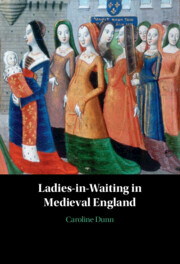Book contents
- Ladies-in-Waiting in Medieval England
- Ladies-in-Waiting in Medieval England
- Copyright page
- Dedication
- Contents
- Figures
- Tables
- Acknowledgments
- Abbreviations
- Introduction
- Part I The People of the Household
- Part II Rhythms of Life
- Part III Power and Its Rewards
- Conclusion: Power, Authority, Influence, and Service
- Bibliography
- Index
Conclusion: Power, Authority, Influence, and Service
Published online by Cambridge University Press: 02 January 2025
- Ladies-in-Waiting in Medieval England
- Ladies-in-Waiting in Medieval England
- Copyright page
- Dedication
- Contents
- Figures
- Tables
- Acknowledgments
- Abbreviations
- Introduction
- Part I The People of the Household
- Part II Rhythms of Life
- Part III Power and Its Rewards
- Conclusion: Power, Authority, Influence, and Service
- Bibliography
- Index
Summary
The many years of service evident in the careers of some ladies-in-waiting who received annuities for decades while continuing to complete responsibilities in the royal household demonstrates that the opportunities of court service were valued by many. Such service offered one of the only salaried professional positions available to women in later medieval England, and for many was a true career. Families sought to promote their daughters at court because female servants could seek to gain not only remuneration but also intangible patronage opportunities for themselves, their families, and their associates. Employment in elite households enhanced servants’ loyalty, built and deepened relationships, and also heightened the status of the royals and nobles who bestowed rewards. Including gender in the analysis helps us to recognize the porous boundary between domestic life and political life at the royal court, and, in an era when politics was all about access to the decision-making monarch, female courtiers enjoyed and benefitted from such informal routes to access. Although in service, and always answerable to the needs and commands of their queens and aristocratic employers, understanding the history of ladies-in-waiting underscores how they nevertheless found ways to exercise agency and access political power in medieval England.
- Type
- Chapter
- Information
- Ladies-in-Waiting in Medieval England , pp. 284 - 287Publisher: Cambridge University PressPrint publication year: 2025

